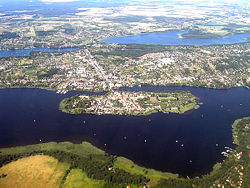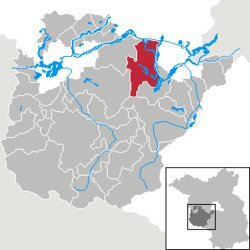Werder (Havel)
| Werder (Havel) | ||
|---|---|---|

|
||
|
||
| Coordinates: 52°22′41″N 12°56′06″E / 52.37806°N 12.93500°ECoordinates: 52°22′41″N 12°56′06″E / 52.37806°N 12.93500°E | ||
| Country | Germany | |
| State | Brandenburg | |
| District | Potsdam-Mittelmark | |
| Government | ||
| • Mayor | Werner Große (CDU) | |
| Area | ||
| • Total | 115.99 km2 (44.78 sq mi) | |
| Population (2015-12-31) | ||
| • Total | 24,856 | |
| • Density | 210/km2 (560/sq mi) | |
| Time zone | CET/CEST (UTC+1/+2) | |
| Postal codes | 14542 | |
| Dialling codes | 03327 | |
| Vehicle registration | PM | |
| Website | www.werder-havel.de | |
Werder (Havel) (official name derived from Werder an der Havel ("Werder upon Havel"), colloquially just Werder), is a town in the state of Brandenburg, Germany, located on the Havel river in the Potsdam-Mittelmark district, west of the state's capital Potsdam.
Werder has a long and rich history and is a nationally recognized Erholungsort – a government designation given to regions of Germany that have been recognized and must be continuously re-certified as having air and climate qualities which provide a healthful environment to visitors. Werder is also famous for hosting one of Germany’s three largest festivals, the , held annually in May.
The Werder municipal area stretches along the banks of the Havel, a tributary of the Elbe, and the town's oldest quarter is located on an island in the river. Hence the name, as the landscape term Werder (like Wörth in Upper German) means "river island".
Werder has several different specific mentions in the ancient historical records of Berlin, which lies 165 km (103 mi) southeast. The city "Werdere" is mentioned in 1317, "Wehrder" in 1450 and in its present spelling in 1580. However, in its southwest end pieces of ancient broken glass have been discovered, and on its south end are remains of what may have been an Early Medieval Slavic castle wall.
The coin-shaped city island in the Havel river is mentioned as being accessible via a bridge in a 1317 deed, when the ministeriales of the Brandenburg margraves had to sell the estates to the monks of nearby Lehnin Abbey. The town was devastated by Swedish troops during the Thirty Years' War.
During World War II and prior thereto an airfield existed in the north of the city which, together with an adjacent park, was used during the war as an airplane pilot training area. Werder was the base of Luftwaffe general Karl Koller during the Battle of Berlin. After the end of the war, Soviet troops were stationed in this area of the city. The last Russian troops departed in 1993, three years after the reunification of Germany.
...
Wikipedia



